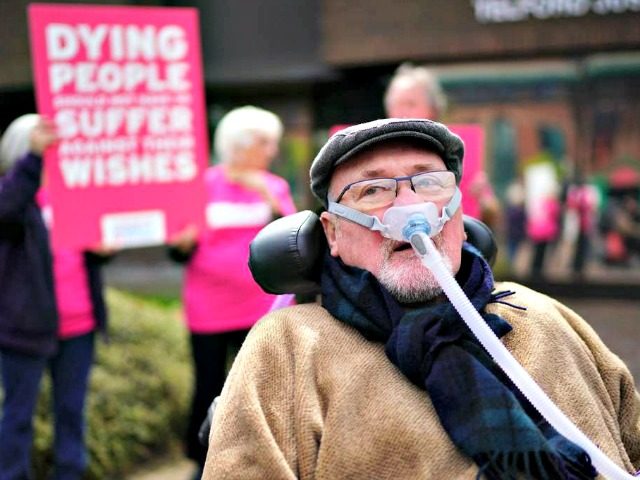Maryland rejected assisted suicide when a bill that passed the House of Delegates later stalled in the state Senate.
Senate Bill 311, dubbed the End of Life Options Act, died in the state Senate Wednesday with a tie vote of 23-23. The House of Delegates passed the measure, 74-66, following a heated debate.
The legislation had already failed several times before in the state’s General Assembly.
When the bill moved on to the state Senate, a committee added many requirements for terminally ill patients to obtain the lethal drugs required to commit suicide.
The measure that passed the House of Delegates would have allowed terminally ill individuals who have been told they have less than six months to live to request the lethal drugs.
A coalition called Maryland Against Physician Assisted Suicide celebrated the defeat of the bill on Twitter:
“This is a great victory for everyone who fought so hard to educate Maryland legislators about why physician-assisted suicide is unnecessary, dangerous, and wrong for our residents,” said a post on the coalition’s website. “Together we showed that, even though this is an extremely controversial issue, when legislators really learn about the details of this proposal, and especially its lack of safeguards for our most vulnerable residents, they see that it should not pass.”
Democrat state Sen. Obie Patterson, a Baptist, did not vote on the assisted suicide bill, reported the Baltimore Sun.
“I did not cast a vote simply because I could not bring myself to move right or left on the bill and therefore I didn’t vote at all,” Patterson said. “I researched it, I talked with folks and my decision today was not to cast a vote.”
“But I think I did my job,” Patterson added in response to questions about the Maryland Senate’s rule requiring every present member to vote on each issue.
“I did not relinquish my responsibility to thoroughly review all of the concerns I had about the bill,” he said. “At the end of the day, I felt I could not cast a vote.”
According to the Sun, some of the senators expressed concern about voting in favor of legislation that ultimately leads to death:
Sen. Michael Hough, a Frederick County Republican, said that his vote in favor of keeping the death penalty has haunted him. He pledged to himself that if he ever faced a vote like that again, “I would err on the side of life.”
Others questioned the logic of allowing doctors, who they see as people who save lives, to participate in a process that leads to death.
“There are no do-overs in this type of law,” said Sen. Bryan Simonaire, an Anne Arundel County Republican. “Doctors have and will continue to make mistakes and miscalculations. They are humans. Once a life is taken, it is final.”
However, Democrat state Sen. Nancy King, said the decision was similar to that for abortion.
“That decision is between me and my God and nobody else,” she said.
Kim Callinan, CEO of Compassion & Choices – proponents of assisted suicide – called the demise of the bill in Maryland a “temporary setback.”
“But we are confident that it is just a matter of time before a version of this legislation similar to the House-passed bill, which is based on proven laws in eight other jurisdictions, becomes law,” she said in a statement. “Maryland voters strongly support medical aid in dying and terminally ill residents desperately need this option to end needless suffering, so they can die in peace.”
Opponents of the legislation, however, said making assisted suicide legal risks abuse of vulnerable individuals.
According to the Washington Free Beacon, Matt Valliere, executive director of the Patients’ Rights Action Fund, said “countless Marylanders are safer today because legislators rejected” the bill.
“All bills that would legalize assisted suicide make for dangerous public policy, especially for persons living with disabilities, the terminally ill, people of advanced age, and those who are at an economic disadvantage,” Valliere said. “They are the most likely to suffer because of mistakes, coercion, and abuse—as we have seen happen in places that do allow assisted suicide.”
Dr. T. Brian Callister of the Nevada chapter of the American College of Physicians, opposed the legislation based on his experience with health insurers in Oregon and California attempting to push vulnerable patients into choosing suicide via lethal drugs – a cheaper alternative to potentially life-saving treatments or hospice care:
“Maryland citizens can breathe a sigh of relief, at least for the time being, that their rights to access life-saving and life-sustaining treatments will not be trampled on by those wishing to extend their ‘right to die’ as a mandate on others,” Callister said, according to the Free Beacon. “This is a victory for senior citizens, the chronically ill, the disabled, and the terminally ill as we have a reprieve from the coercion being thrust upon them.”
Assisted suicide is currently legal in Washington, DC, California, Colorado, Hawaii, Montana, Oregon, Vermont, and Washington.
New Jersey’s legislature passed its assisted suicide bill last week and Democrat Gov. Phil Murphy said he “look[s] forward to signing” the measure into law.

COMMENTS
Please let us know if you're having issues with commenting.